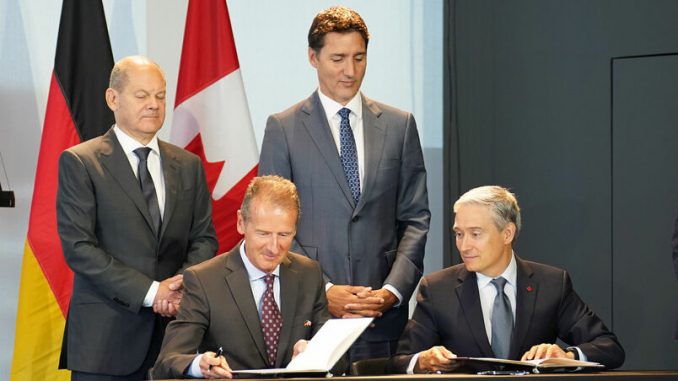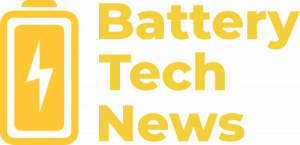
- Volkswagen signs agreement with Prime Minister Justin Trudeau’s government on battery value creation and raw material security
- Volkswagen Group’s battery company PowerCo pushes ramp-up of its global battery business, further proof of Volkswagen’s ambitious growth strategy in North America
Volkswagen AG and the Government of Canada aim to promote e-mobility in the country and to explore opportunities across Canada’s automotive and battery supply chain. This was agreed in a “Memorandum of Understanding” (MoU) signed today in Toronto by Volkswagen CEO Herbert Diess and Canada’s Minister of Innovation, Science, and Industry, François-Philippe Champagne, in the presence of German Chancellor Olaf Scholz and Canadian Prime Minister Justin Trudeau. Both parties will investigate opportunities for Canada to contribute to Volkswagen’s global and regional battery supply chains. PowerCo, the newly founded battery company of the Group, has a central role in these efforts and will drive forward the planned cooperation in the fields of battery value creation, raw materials supply chains and cathode material production in the North American region.
PowerCo SE is responsible for all global Group activities along the battery value chain, securing battery cell supply for Volkswagen’s e-mobility push. The rapidly growing global battery cell business is a key pillar of Volkswagen’s NEW AUTO strategy, which aims to make Volkswagen the leading provider of sustainable and software-driven mobility. The plan is to quickly build up highly standardized cell production capacities totaling 240 gigawatt hours per year in Europe alone. In addition, there are plans to establish a dedicated gigafactory in North America. Possible production sites are currently being examined.
Olaf Scholz, Chancellor of the Federal Republic of Germany: “I welcome that Volkswagen and Canada have signed a Memorandum of Understanding on battery value creation today. This is excellent proof that the cooperation with our close friends and allies in Canada is further deepening also in the context of raw material security and may encourage other companies to follow.”
The Honourable François-Philippe Champagne, Minister of Innovation, Science and Industry, said: “Canada is quickly becoming the green supplier of choice for major auto companies, including leading European manufacturers, as we transition to a cleaner, greener future. By partnering with Volkswagen, Canada is strengthening its leadership role as a world class automotive innovation ecosystem for clean transportation solutions. Canada is committed to building a strong and reliable automotive and battery supply chain here in North America to help the world meet global climate goals.”
Dr. Herbert Diess, CEO of Volkswagen Group: “Volkswagen has been vigorously pushing the transformation to e-mobility, recognizing the industry‘s responsibility in the global battle against climate change. The Group today not only offers the broadest range of electric models to customers but is also rolling out an ambitious battery and charging strategy. Working hand in hand with governments around the world is an absolute prerequisite to meet our climate goals and I want to thank the Canadian government for their support. The supply of battery raw materials and the production of precursor and cathode materials with a low carbon footprint will allow for a fast and sustainable ramp-up of battery capacity — a key lever for our growth strategy in North America.“
Thomas Schmall, Volkswagen Group Board of Management member for Technology: “As an automaker, we see compliance with stringent sustainability criteria as a top priority. For us, the availability of power from renewable sources and a raw materials sector with mines supplying materials conforming to the globally recognized environmental and social standards are crucially important. That is why Canada is an ideal partner for our e-mobility and battery strategy.”
Joint statement with respect to sustainable battery manufacturing and reliable raw material supply
For the development of sustainable battery production, both parties intend to boost cooperation based on recognized ESG (Environment, Social, Governance) criteria between PowerCo and the Canadian mining sector, which is seen as a world leader in terms of responsibility and transparency. For this purpose PowerCo is planning to establish a new, dedicated liaison office in Canada. A key focus of cooperation is the supply of critical raw materials such as lithium, nickel and cobalt.
Both parties see significant prospects for Volkswagen and PowerCo to ramp up cathode material production together with partners and to offer Canadian suppliers an opportunity to act as raw material suppliers, refiners and processors.
With its vast raw material resources, good infrastructure and highly developed automotive industry with considerable production expertise and highly qualified workforce, Canada sees itself outstandingly well-positioned for joint projects.
Schmall commented: “The Government of Canada is a forward-thinking, effective enabler of businesses creating future-proof, well-paying jobs for Canadians, particularly in the green economy. This is one reason why Volkswagen and PowerCo are excited to work with such an approachable partner offering promising cooperation and engagement at all levels of government.”
Next Step of Growth Strategy for North America
The Volkswagen Group brands plan to offer the most comprehensive electric product portfolio in North America with more than 25 battery-electric models by the end of the decade; at the same time, strong regional capabilities for EV research and development, vehicle assembly, component production and supply relationships are being expanded across the North American continent.
“We’re committed to bringing electric mobility to consumers and communities in North America. Today’s agreement between the Volkswagen Group and the Government of Canada will enable us to work closely with local suppliers and expand our capabilities,” said Pablo Di Si, incoming President and CEO, Volkswagen Group of America, Inc. “We continue to invest in electrification with plans to launch more than 25 battery-electric vehicles planned by 2030. A broad-based supply of raw materials from across the region will be key to support our ambitious growth plans.”
